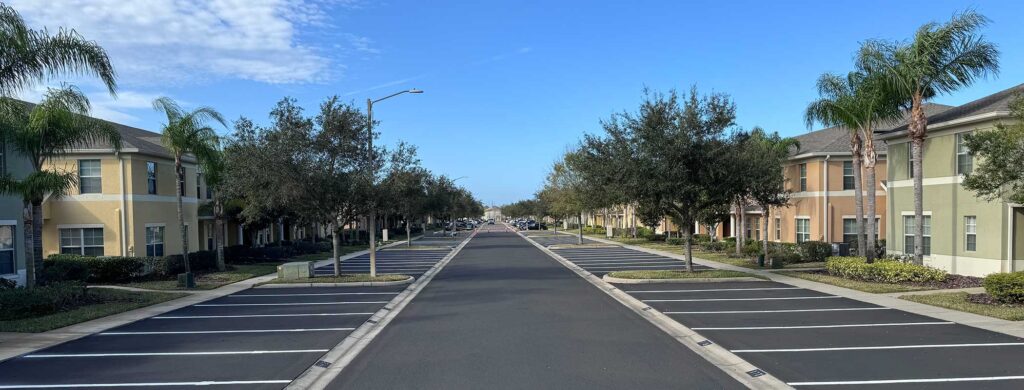Asphalt vs. Concrete Paving Solutions. In the realm of paving solutions, asphalt and concrete stand as two formidable contenders Each offering unique advantages and considerations for various applications. Whether you’re planning a driveway, parking lot, or roadway, the choice between asphalt and concrete can significantly impact the performance, longevity, and cost-effectiveness of your project. In this blog post, we’ll conduct a comprehensive comparison of asphalt and concrete paving solutions, helping you make an informed decision that aligns with your specific needs and preferences.
Understanding Asphalt Paving:
Asphalt paving stands as a cornerstone in the world of infrastructure development, offering a myriad of benefits and characteristics that make it a preferred choice for various applications. Let’s delve into the key aspects of asphalt paving:
Flexibility and Durability:
One of the most notable features of asphalt paving is its inherent flexibility and durability. Engineers design asphalt pavements to withstand changing climates, heavy traffic, and dynamic load conditions. The flexibility of asphalt allows it to expand and contract with temperature fluctuations, minimizing the risk of cracking and deterioration over time. This resilience makes asphalt pavements ideal for regions subject to extreme weather conditions and heavy use, ensuring long-lasting performance and structural integrity.
Quick Installation and Minimal Disruption:
Asphalt paving projects offer the advantage of quick installation and minimal disruption to surrounding environments. Contractors can lay and compact asphalt pavements quickly, reducing construction timelines and minimizing disruption to traffic flow and business operations. Asphalt paving’s efficiency makes it the top choice for road resurfacing, maintenance, and rehabilitation projects prioritizing time.
Cost-Effectiveness and Affordability:
Another compelling aspect of asphalt paving is its cost-effectiveness and affordability. Asphalt pavements are generally more economical to install compared to concrete, making them a cost-effective solution for budget-conscious projects. The lower material costs, combined with quicker installation times and reduced labor requirements, contribute to the overall affordability of asphalt paving projects. Additionally, the ability to recycle and reuse asphalt materials further enhances its cost-effectiveness and sustainability, making it a preferred choice for environmentally conscious developments.
Environmental Sustainability:
Asphalt paving also stands out for its environmental sustainability and recyclability. Recyclable materials in asphalt pavements, such as aggregates, binders, and additives, can be reclaimed and reused in new paving projects. This sustainable approach reduces the demand for virgin materials, conserves natural resources, and minimizes waste sent to landfills. Furthermore, the energy efficiency of asphalt production processes and the ability to incorporate recycled materials contribute to the overall environmental footprint of asphalt paving, making it an environmentally responsible choice for infrastructure development.
In summary, asphalt paving offers a versatile, durable, and cost-effective solution for a wide range of infrastructure projects. From roads and highways to parking lots and driveways, asphalt pavements provide smooth, reliable surfaces that enhance mobility, safety, and convenience for communities worldwide. Understanding the key characteristics and benefits of asphalt paving is essential for informed decision-making and sustainable urban development initiatives.
Exploring Concrete Paving Solutions:
Concrete paving stands as a stalwart in the realm of pavement solutions, renowned for its strength, durability, and long-term performance. Let’s delve into the key characteristics that define concrete paving and make it a preferred choice for various applications:

Strength and Durability:
Engineers design concrete pavements to provide unmatched strength and durability, making them an excellent option for areas exposed to heavy traffic and intense loads. The unique composition of cement, aggregates, water, and additives creates a rigid surface capable of withstanding the rigors of daily use and enduring prolonged exposure to harsh environmental conditions. Concrete pavements excel in high-traffic areas such as highways, airport runways, and industrial facilities, where durability and reliability are paramount.
Low Maintenance:
Concrete paving boasts low maintenance requirements compared to its asphalt counterpart. Routine maintenance tasks such as sealing and joint maintenance, help prolong the lifespan of concrete pavements and preserve their appearance over time. Unlike asphalt, which may require periodic resurfacing and repairs, concrete pavements maintain their structural integrity and aesthetic appeal with minimal intervention, resulting in reduced maintenance costs and enhanced longevity.
Long-Term Investment:
While concrete paving may entail higher initial costs compared to asphalt, its longevity and durability make it a sound long-term investment for infrastructure projects. Concrete pavements have a proven track record of delivering reliable performance and withstanding the test of time, offering a cost-effective solution for municipalities, transportation agencies, and commercial enterprises seeking sustainable infrastructure investments. The long-term benefits of concrete paving, including reduced maintenance expenses and extended service life, outweigh the upfront costs and position it as a wise investment in the future.
In summary, concrete paving embodies strength, durability, and longevity, making it a preferred choice for a wide range of applications. From highways and airport runways to parking lots and industrial facilities, concrete pavements offer unmatched performance and reliability, backed by decades of engineering expertise and technological advancements. As urban infrastructure continues to evolve, concrete paving remains a cornerstone of modern construction practices, providing communities with safe, sustainable, and resilient transportation networks for generations to come.
Key Considerations for Decision-Making in Paving Solutions:
Key Considerations for Decision-Making:
Choosing between asphalt and concrete paving solutions requires careful consideration of several factors to ensure the optimal performance and longevity of the pavement. Here are the key considerations that should guide your decision-making process:
Traffic Volume and Load:
Traffic volume and load play a crucial role in determining the suitability of asphalt or concrete paving solutions for a particular application. Asphalt pavements are well-suited for low to medium-traffic volumes and loads, offering flexibility and resilience to accommodate moderate vehicle traffic. In contrast, concrete pavements excel in high-traffic areas with heavy loads, providing exceptional strength and durability to withstand the rigors of constant vehicle movement and intense pressure.
Climate and Environment:
Climate conditions and environmental factors can significantly impact the performance and longevity of paving materials. In colder climates, asphalt pavements may be prone to cracking due to freeze-thaw cycles and temperature fluctuations. Concrete pavements, while more resilient to temperature changes, may experience spalling or surface deterioration in areas with frequent freeze-thaw cycles. It’s essential to consider local climate conditions and environmental factors when selecting the most suitable paving solution for your project.
Maintenance Requirements for Paving:
Maintenance requirements vary between asphalt and concrete pavements and should be factored into the decision-making process. Asphalt pavements require regular maintenance, including sealcoating . Crack sealing, to protect against moisture intrusion, prevents cracks and deterioration, and extends the pavement’s lifespan. Concrete pavements may need periodic joint maintenance. Sealing to prevent water infiltration and preserve the integrity of the pavement structure. Understanding the maintenance needs of each paving material is essential for ensuring optimal performance and minimizing long-term repair costs.
Cost and Budget:
Cost considerations play a significant role in the decision-making process when comparing asphalt and concrete paving solutions. While asphalt pavements typically have lower initial installation costs compared to concrete. They may require more frequent maintenance and repair over their lifespan, resulting in higher long-term expenses. Concrete pavements, while initially more expensive to install, offer greater durability. Longevity, requiring fewer maintenance interventions and potentially reducing overall lifecycle costs. It’s essential to evaluate both the upfront installation costs and long-term maintenance expenses. To determine the most cost-effective paving solution that aligns with your budgetary constraints and project requirements.
Making the Right Choice for Your Paving Solutions Project
In conclusion, the choice between asphalt and concrete paving solutions depends on a variety of factors, including traffic volume. Climate conditions, maintenance requirements, and budget considerations. Both asphalt and concrete offer distinct advantages and considerations. The optimal choice will depend on the specific needs and priorities of your project. By conducting a comprehensive comparison of asphalt and concrete paving solutions. Considering key factors such as traffic volume, and climate conditions. Maintenance requirements, and budget considerations, you can make an informed decision that ensures long-term success. Performance of your paving project. Whether you opt for the flexibility of asphalt or the strength of concrete, choose the right paving solution. It is essential for achieving durability, longevity, and cost-effectiveness in your infrastructure investment.About the author:
Express Asphalt Solutions, your premium asphalt business in Florida. With the focus on quick, affordable, and top-notch services. We specialize in asphalt paving and repair, sealcoating, as well as parking lot striping. Our skilled team ensures your parking areas are safe, organized and visually appealing. From commercial properties to residential communities, we cater to all your asphalt needs with precision and care. Enhance the functionality and appearance of your parking spaces with our quality solutions. Contact us now for a free quote and experience the different Express Asphalt Solutions can make! See some of our Clients review here"*" indicates required fields





